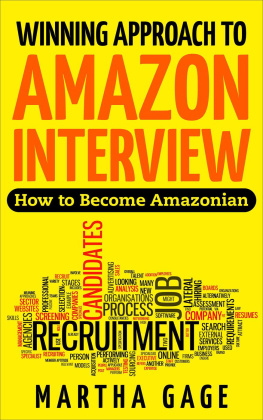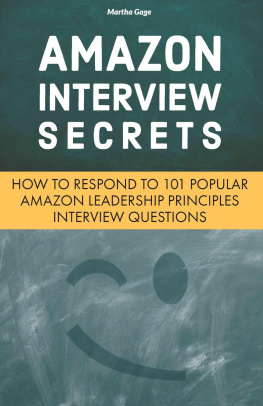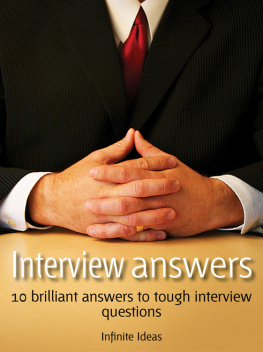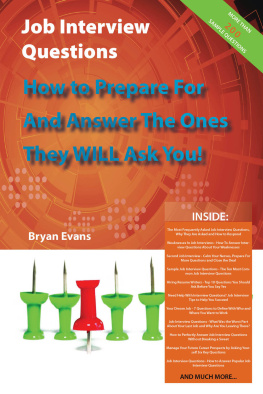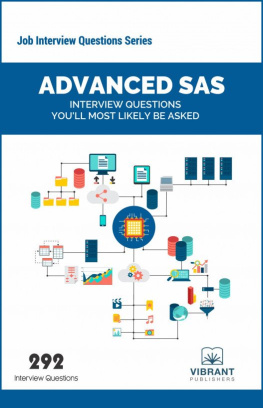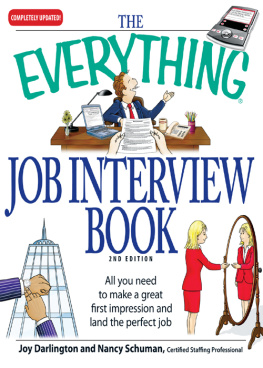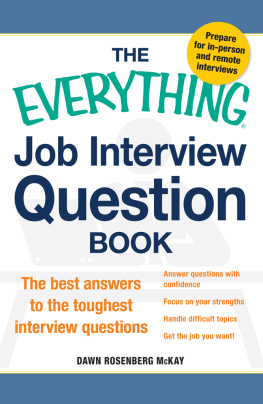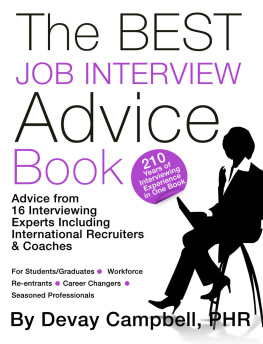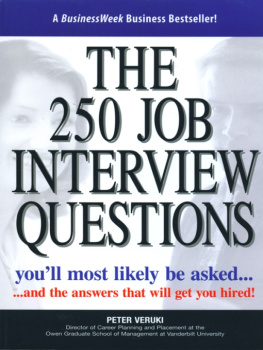The STAR Method Explained
Proven Techniqueto Succeed at Interview
Martha Gage
Copyright 2021 by Martha Gage
All rights reserved.
The content contained within this book may not be reproduced, duplicated or transmitted without direct written permission from the author or the publisher.
Under no circumstances will any blame or legal responsibility be held against the publisher, or author, for any damages, reparation, or monetary loss due to the information contained within this book. Either directly or indirectly.
Legal Notice:
This book is copyright protected. This book is only for personal use. You cannot amend, distribute, sell, use, quote or paraphrase any part, or the content within this book, without the consent of the author or publisher.
Disclaimer Notice:
Please note the information contained within this document is for educational and entertainment purposes only. All effort has been executed to present accurate, up to date, and reliable, complete information. No warranties of any kind are declared or implied. Readers acknowledge that the author is not engaging in the rendering of legal, financial, medical or professional advice. The content within this book has been derived from various sources. Please consult a licensed professional before attempting any techniques outlined in this book.
By reading this document, the reader agrees that under no circumstances is the author responsible for any losses, direct or indirect, which are incurred as a result of the use of information contained within this document, including, but not limited to, errors, omissions, or inaccuracies.
CONTENTS
Introduction
Welcome and thank you for your purchase of The Star Method Explained. In this book you will learn about STAR framework and how it can assist you in behavioral questions in interviews and more! The topics covered will be:
- Employer Priorities: Getting you in the proper mindset for learning the process by assuming the role of Interviewer. What sort of answers would you want to hear if you were asking the same questions day after day?
- Creating a Measurable Difference: In this chapter, we go further into a winning interview mindset by taking the time to chronicle and sort your skills and work experiences in preparation for STAR!
- Communicating a Measurable Difference: Here you will learn how to take experiences and select key stories for use in interviews.
- STAR Framework: Now that weve assessed ourselves, we are ready to learn the STAR system. No more nervous interviews!
- Action Verbs Tell a Story: Enhance your stories with action verbs to give them that extra zing.;
- Interview Questions and Answers: We have compiled a list of some of the most popular of those tricky questions you might get during interviews. This will give you a chance to see what your STAR lessons lead to as you respond.
- Creating Your STAR Resume: How to bring that STAR power to your resume.
- STAR Cover Letters: How to write cover letters that will MAKE them want to read your resume!
We will provide examples along the way to start building a strong foundation. If it seems complicated at first, don't worry, because we have you covered. Stick with us and follow our tips and examples and you will be using the STAR system to your benefit in no time.
Take notes as you go along and you will have the basics of this system down. After that, start targeting the job that you have been dreaming of and don't be nervous about the interview.
Why worry about interviews, anyways? Youve got a shining STAR!
Chapter 1: Employer priorities
You have been interviewed before, of course. You know the range of questions can be both alarming and disarming, but have you considered things from the side of the Interviewers?
For them, interviewing can be a somewhat tedious process. Asking some of the same questions over and over, noting the responses that stick out... and that is what we want to focus on in this chapter. Putting yourself in the interviewers shoes. This way you can get a chance to modify your perspective a little and to try to ask yourself, What would I be looking for? What information is interesting, relevant, and valuable? It is a valuable little exercise.
We are going to start with things you should avoid saying during interviews and then move on to answers that interviewers enjoy hearing, so we can give you some contrast and a better understanding of what your words are really saying about you!
Do's and Don'ts in an interview
Lets see what you, as an interviewer, would prefer to hear. We have compiled some common questions that you have probably heard in many interviews. Assuming you are a Team Leader or Manager tasked with interviewing, which answers might cause alarm bells to go off in your head?
1. Question: What is your biggest weakness?
Response 1: I think that my biggest weakness is that I work too hard.
Response 2: I haven't had any formal training in leadership, so sometimes I feel nervous when I've been given authority.
As an Interviewer, you might smile when you hear the first response but you'll probably be more likely to hire the second responder. The goal of this question is to determine if you have an accurate and realistic understanding of your strengths and weaknesses. Everyone has a weakness. Be honest about skills you would like to develop and be sure to have an answer or two ready for this question.
2. Question: What did you like least about your last job?
Response 1: They were a bad company. I never got time off and the managers there don't know what they are doing.
Response 2: My commute to work took a very long time.
This is a question that you have to answer carefully. As an Interviewer, if you heard someone badmouthing their previous company, what would you feel the chances of them doing the same to your own should they interview somewhere else? As an Interviewer something innocuous like Response 2 is certainly preferable, no?
3. Question: Why should we hire you?
Response 1: I don't know. I think that I could do a good job and I work hard."
Response 2: I like working with people and so I think that I'd be a great fit for customer service.
As an Interviewer you might ask this question 20 times in one day. Wouldn't you rather hear from an applicant that have considered the position they are trying for and determined why they want it?
4. Question: Can you tell me a little about yourself?
Response 1: Well, I like video games and travelling. I read a lot and my favorite food is pizza.
Response 2: I've worked as a customer service representative for the last 5 years and one of my specialties is dealing with difficult customers.
As an Interviewer, Response 2 is going to be a lot more relevant for what you are hoping to accomplish. While you probably wouldn't mind a little personal information, if it is combined with work experience, you probably don't want to hear the applicants life story.
5. Question: Do you work well with others?
Response 1: I think that I am. My last team didn't like me but I think they were just intimidated by my work style. I'm sure that I'll fit right in here.
Response 2: I feel that I do. I try to make an effort to learn and use everyone's name quickly to establish rapport. I'm also a good listener and my priority is getting the job done, not getting the credit.


